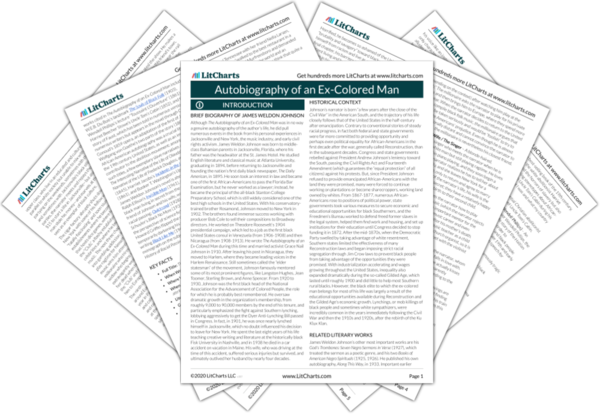Racism and the Color Line
The mixed-race narrator of James Weldon Johnson’s The Autobiography of an Ex-Colored Man manages to move back and forth between the rigidly segregated worlds of black and white America at the turn of the twentieth century. Because he can “pass” for white, the narrator gets a firsthand look at the white Americans’ violent prejudices and comes to understand that legal emancipation cannot improve the opportunities available to black Americans without a radical and sustainable change…
read analysis of Racism and the Color LineCollective Progress and Individual Achievement
Throughout his life, the narrator maintains a tumultuous relationship with other African-Americans: he alternatingly disavows and identifies with his blackness, as well as the economic and political struggles of the more destitute and oppressed black people he encounters. Most of all, he consistently prioritizes his individual achievement over his role in a racial community, even if he understands the necessity to fight collectively against racism. At the very end of his book, he declares that…
read analysis of Collective Progress and Individual AchievementMusic, Emotion, and American Culture
Throughout his life, the narrator of The Autobiography of an Ex-Colored Man finds solace, creative expression, and social status through music: because of its emotional power, it is perhaps the only thing in this book (besides the protagonist himself) that crosses the otherwise rigid boundary between the white and black worlds. The narrator becomes an expert in the racialized registers of white classical music and black ragtime and slave hymns, and eventually he decides to…
read analysis of Music, Emotion, and American Culture
Secrecy, Purity, and Origins
Because his very existence transgresses the American racial order that demands the strict social, emotional, and sexual separation of white and black people, the narrator’s life is largely defined by the secrets he keeps from the world, from the secret of his paternity to that of his blackness. The novel itself—with its anonymous narrator and author, initially assumed to be the same person—relies on a similar secrecy about the truth of identity. Both kinds…
read analysis of Secrecy, Purity, and Origins






